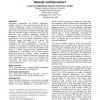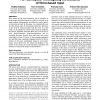234 search results - page 15 / 47 » First vs. best improvement: An empirical study |
FGR
2008
IEEE
14 years 3 months ago
2008
IEEE
We recognize faces from our own race better than those from another race. Although the relative contribution of different mechanisms (e.g. contact vs. attention) remains elusive, ...
PODC
2010
ACM
14 years 15 days ago
2010
ACM
We quantify the effect of Bayesian ignorance by comparing the social cost obtained in a Bayesian game by agents with local views to the expected social cost of agents having glob...
STOC
2012
ACM
11 years 11 months ago
2012
ACM
d abstract; full version begins on page 13) Ryan O’Donnell∗ John Wright† November 2, 2011 We show that distinguishing 1 2 -satisfiable Unique-Games instances from (3 8 + )-...
CHI
2008
ACM
13 years 10 months ago
2008
ACM
Information visualizations can improve collaborative problem solving, but this improvement may depend on whether visualizations promote communication. In an experiment on the effe...
CHI
2009
ACM
14 years 9 months ago
2009
ACM
Most studies on tilt based interaction can be classified as point-designs that demonstrate the utility of wrist-tilt as an input medium; tilt parameters are tailored to suit the s...


